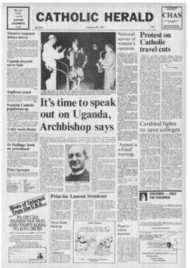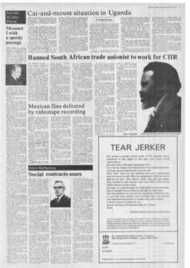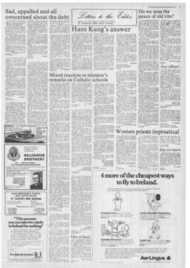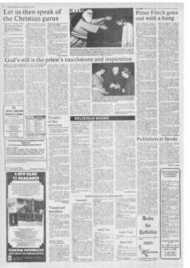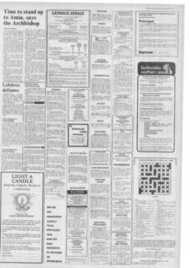Page 3, 25th February 1977
Page 3

Report an error
Noticed an error on this page?If you've noticed an error in this article please click here to report it.
Tags
Share
Related articles
S African Man's Visit
People And Places People And Places ... People And Places...
Black And White On Investment And Morality In South Africa
Ciir
Catholic Institute Withdraws Investments From Barclays
Banned South African trade unionist to work for CIIR
MR DRAKE KOKA, a Catholic trade unionist from South Africa, arrived in London recently and is to spend six months working for the Catholic Institute for International Relations.
A founder-member of the Black People's Convention in South Africa and a full-time organiser of the Black Allied Workers' Union, Mr Koka was forced to leave South Africa v hen a warrant for his arrest was issued under the banning order on trade union leaders.
Having already spent eight months in solitary confinement in a South African prison and being the subject of a five-year banning order preventing him from attending public meetings and placing him under house arrest at weekends, Mr Koka now sees his role as spreading awareness about the South
African situation throughout Britain and Europe.
As a trade unionist, Mr Koka welcomes the recent attempt of unions to stage a token boycott of South African goods and services, but feels that of itself it will have little effect.
"The boycott should be for a longer period," he says. "If trade unionists could organise such a boycott it would be the most effective non-violent way of demonstrating to the Vorster Government that their policies are wrong.
"If people are not prepared to put this non-violent pressure on the South African Government we shall find ourselves with no alternative but to resort to armed struggle."
One of the arguments frequently advanced against a policy of economic boycott of South Africa is that the black population would be the first to suffer by a withdrawal of investment and consequent damage to industry. This, says Mr Koka, is simply a convenient illusion.
"When Britain appealed to the United Nations to impose sanctions on Rhodesia, nobody advanced the argument that the blacks would suffer despite the fact that there are six million blacks in Rhodesia.
"But when we appeal for a boycott of South Africa everyone says the blacks will suffer most by the withdrawal of investments. This is not true. The blacks possess nothing, so they will lose absolutely nothing.
"Britain must stop selling small arms to South Africa. One of the prominent issues at the moment is the use of the 'Hippo' riot car. This car is built by British Leyland, and as I speak now it is out on the streets of Soweto shooting our children."
Mr Koka, who was among those who campaigned for the appointment of black bishops in South Africa, says the present stand by the Church in opening its schools to all races is courageous.
"Unfortunately their stand has come 20 years too late. By now the polarisation has gone so far that it is going to be very difficult to integrate blacks and whites."
Government administrators in the Cape and Transvaal provinces have reacted strongly to the Church's decision, and have threatened to de-register schools accepting black children. Mr Koka believes, however, that the Government will avoid an open confrontation with the Church.
"I think the Government finds itself in a predicament because any retaliation against the Church would mean a confrontation with the white community, and this would splinter white solidarity.
"I think the Government will soft-pedal the issue, but my suspicion is that they will intimidate black parents into withdrawing their children from the schools. "
The Church's action has given a lead to the white community to take a stand against racism, says Mr Koka.
"We realise that the whites are on the path to commit suicide, and our task at the moment is to call them back into the human fold. In the final analysis we will be the preservers of the white people in South Africa. They have no need to fear.
"I don't know why the white people are panicking. We are not against them, but against the oppressive and racist legislation of the Vorster Government.
"At the height of the Soweto protests, when the black students marched into the heart of Johannesburg and mixed freely on the streets with the whites, not one white was killed."
One of the issues that Mr Koka wants to bring to the attention of the British public is the number of black detainees dying in South African prisons.
"At least 16 people have died in detention in a period of six months. That is an average of nearly three people a month. The Government claims they committed suicide, but the truth is that these people have been murdered by the police.
"If the European public would make the same outcry about these deaths, as they made about the murder of the Rhodesian missionaries, then the Vorster Government would be aware that the whole world is rebelling against their atrocious acts."
Mr Koka says that one day he hopes to return to the free Republic of Azania, and believes that that will soon be possible.
"The people's struggle cannot be measured by years. It can be measured by its intensity: the more intensive the struggle, the shorter the time until liberation. Our freedom will come soon because we shall have to intensify our act of liberation."
Alex Cosgrave
blog comments powered by Disqus


